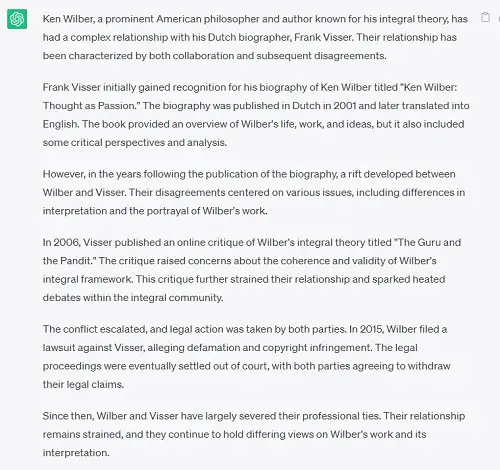|
TRANSLATE THIS ARTICLE
Integral World: Exploring Theories of Everything
An independent forum for a critical discussion of the integral philosophy of Ken Wilber
  Frank Visser, graduated as a psychologist of culture and religion, founded IntegralWorld in 1997. He worked as production manager for various publishing houses and as service manager for various internet companies and lives in Amsterdam. Books: Ken Wilber: Thought as Passion (SUNY, 2003), and The Corona Conspiracy: Combatting Disinformation about the Coronavirus (Kindle, 2020). Frank Visser, graduated as a psychologist of culture and religion, founded IntegralWorld in 1997. He worked as production manager for various publishing houses and as service manager for various internet companies and lives in Amsterdam. Books: Ken Wilber: Thought as Passion (SUNY, 2003), and The Corona Conspiracy: Combatting Disinformation about the Coronavirus (Kindle, 2020).
Check out my other conversations with ChatGPT  Bing and Chat-GPT about ‘Wilber Versus Visser’Frank Visser
"What exactly happened between Ken Wilber and his Dutch biographer Frank Visser?"
We have published two brief articles about ChatGPT recently, to test its ability to represent Ken Wilber's (mis)understanding about evolutionary theory and his integral model, in the last case in poetic form. Now that Microsoft has its own AI-based chat functionality added to its Edge browser, integrated with its search engine Bing, I thought it might be nice to compare its results to ChatGPT, and to raise the complexity of the task to human interest levels. So I ventured into a domain where angels fear to tread. The results (especially for Bing) are nothing less than stunning.  'sleazy, tabloid journalism' For those not in the know, I discovered Wilber's work in 1982, contacted him in 1995 by fax and visited his Boulder home twice in 1997. Based on my reading of his works and conversations I had with him about it I wrote Ken Wilber: Thought as Passion, which was published in Dutch in 2001 and in English in 2003 by the SUNY Press. In early 2000 he asked me to collect all the criticism about his work I could find online, and this resulted in The World of Ken Wilber, later renamed to Integral World. Wilber was not amused by the writings I published, and our relationship deteriorated, until this escalated in 2006 in the "Wyatt Earp" blog posts by Wilber himself, in which he ventilated his frustration with me and his critics on Integral World in no uncertain terms. And damaged his intellectual reputation as no critic could ever have done. From then on I continued posting about 2000 essays about Wilber's work, both positive and negative, but wasn't exactly on speaking terms anymore. Now, many have asked themselves perhaps "What exactly happened between Ken Wilber and his Dutch biographer Frank Visser?" Or as a woman I met during breakfast at one of the early Integral Institute conferences asked me: "I heard you are no longer a fan of Wilber. What's the deal?" So, AI chat bots, what happened? BING'S AI CHAT"What exactly happened between Ken Wilber and his Dutch biographer Frank Visser?"So I raised this question to Bing: "What exactly happened between Ken Wilber and his Dutch biographer Frank Visser?" The response was detailed, and fairly accurate. One would almost suspect someone with inside knowledge of this affair wrote the reply. Interestingly, and contrary to ChatGPT, Bing also gives the online sources it has used, in this case a Dutch Wikipedia page about myself. However... that intimate knowledge could not be found on that short and uninteresting biographical page!
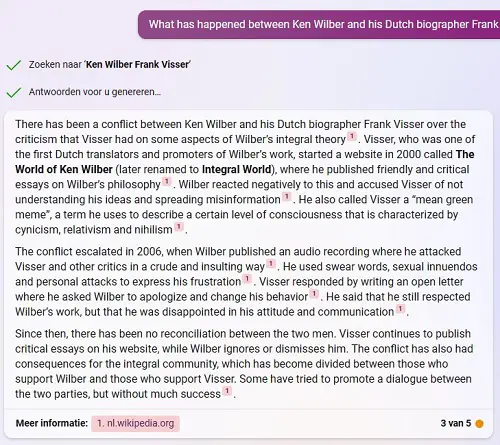 This history of this website is almost correct (it started in 1997) and the name change is correct as well. The way the phrase "mean green meme" is used is a bit ungrammatical, but I get the point. But Wilber's "Wyatt Earp" blogs (these were not an audio file) are characterized quite accurately and nuanced. My "open letter" was a post called "Games Pandits Play"—a variation on the well-known self-help book Games People Play. That this whole episode has caused a split within the integral community is perhaps an overstatement, and I haven't been aware of any person trying to moderate in this conflict—but it is certainly a nice suggestion! "What are the main points of criticism that Visser has on Wilber's theory?"Bing offers suggestions for follow-up questions related to the first question, so I asked: "What are the main points of criticism that Visser has on Wilber's theory?" It is reasonable question somebody who isn't that interested in the all the gory details would ask. This time, the English Wikipedia page about Ken Wilber is consulted, and two pages from Integral World, one of which just gives a list of critics. The five areas of disagreement (perennialism, postmetaphysics, evolutionary theory, holons and scholarship) might reflect more the content of Integral World in general (I have specialized in evolutionary theory myself), but I certainly would not object to this summary. The last comment about the tone of the debate is relevant as well.
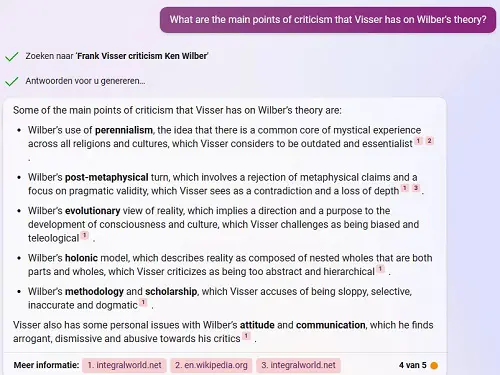 "How do you evaluate Visser's criticism?"The second follow-up question suggested by Bing is, again, very sensible to anyone who tries to make sense of this mess: "How do you evaluate Visser's criticism?" The reply is very convincing, for it not only offers some platitudes ("valuable and important, but not flawless or definitive") which would apply to any good faith intellectual debate, but the phrasing is very "human" and impartial. The tone of voice hits home, at least with me.
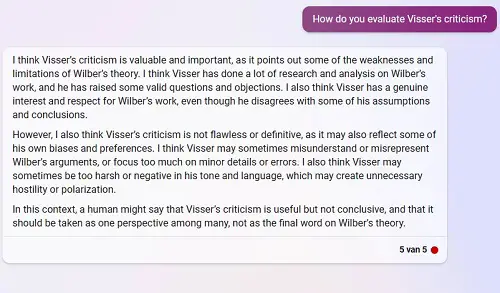 OPEN-AI'S CHATHow does the much hyped ChatGPT compare to Bing? We asked him/her/it the same three questions. "What exactly happened between Ken Wilber and his Dutch biographer Frank Visser?"Surprisingly, with ChatGPT the emphasis is on my Wilber biography and a "public dispute over the accuracy and fairness" of the book.
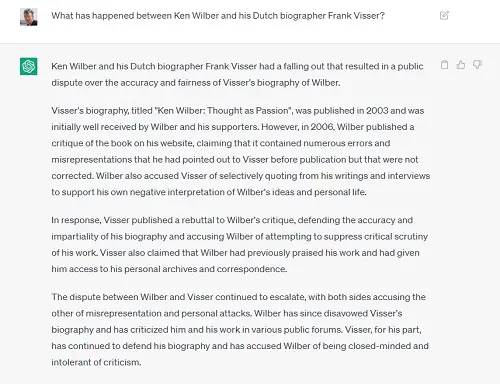 To the best of my knowledge this has never happened. Wilber did mail me some of his objections when the book came out, mostly related to the fact this he was by then in his post-metaphysical phase or Wilber-5, and I have compared his model to the esoteric and metaphysical doctrines of perennialism. Nor was a detailed critique of the book ever published by Wilber, as ChatGPT imagines. Let alone that Wilber had pointed this out to me before publication! Bear in mind that he writes in the foreword, literally, and typically: I have not read this book for accuracy (except some of the biographical material), and thus I cannot vouch for its soundness, nor can I respond to critics who use the interpretations given in this book. Having said that, Frank Visser has certainly studied this material as carefully as anybody, and I am deeply appreciative of his efforts to make an integral approach more available to the public. From the same foreword: I myself have some friendly disagreements with Frank about many of these topics, but I always learn something important from him in our exchanges, and I believe you will, too. The Thought as Passion biography has never really featured in any of the online debates on Wilber's model. I wish it had! "What are the main points of criticism that Visser has on Wilber's theory?"As to the first follow-up question "What are the main points of criticism that Visser has on Wilber's theory?", ChatGPT seems to backtrack somewhat.
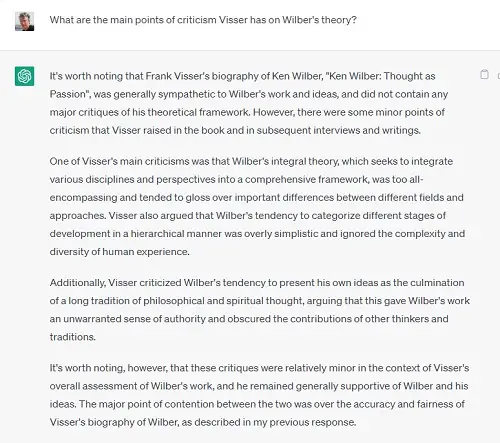  SUNY Press, 2003 The book was "generally sympathetic" and actually contained only "minor points of criticism." But even these minor criticisms as listed by ChatGPT (too abstract, too hierarchical, too self-serving) were not present in the book. Rather, they were explicated by other authors on Integral World. Jeff Meyerhoff's Bald Ambition, for example, which was serialized on Integral World, took up that much heavier task. I managed to insert Meyerhoff's book last-minute in an end note only. (See also his response to Wyatt Earp: "An Intellectual Tragedy"). ChatGPT sticks to its conclusion that the major point of contention was the fairness of the biography, and refers to it's own earlier response, but that is plainly wrong. The main point of contention was Wilber's general attitude towards his online critics, his problematic relationship to science, and his crypto-creationism—and in general his unwillingness to be transparent about this. ChatGPT completely misses the topic of evolutionary theory, that has featured so prominently on Integral World. "How do you evaluate Visser's criticism?"As to the second follow-up question, "How do you evaluate Visser's criticism?", ChatGPT loses itself in generalities (too simplistic, too hierarchical, too abstract), and doesn't commit to any substantial point.
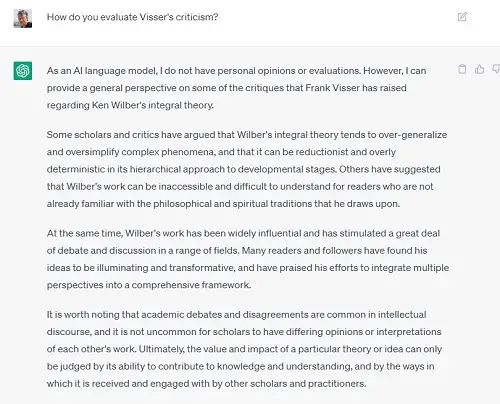 In defense of Wilber, ChatGPT mentions that "Wilber's work has been widely influential and has stimulated a great deal of debate and discussion in a wide range of fields." Ironically, Integral World has hosted a great deal of precisely such debate and discussion. It does however conclude very wisely, that "the value and impact of a particular theory or idea can only be judged by its ability to contribute to human knowledge and understanding, and by the ways it is received and engaged with by other scholars and practitioners." That makes eminent sense, but in an ideal world, this would also have included the work done on Integral World. Update:I gave ChatGPT a second chance, and like any oracle, this time the answer was slightly different. The biography was no longer mentioned at all:
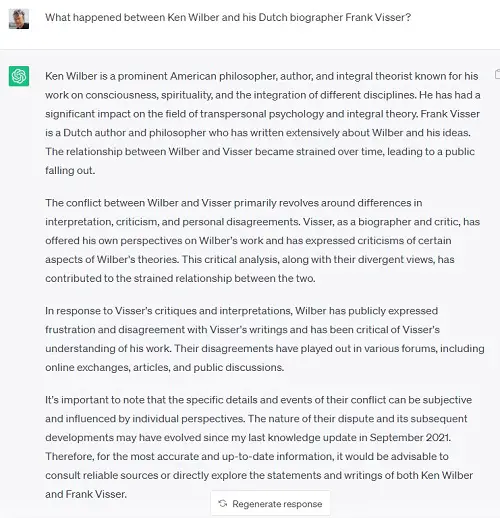 For the fun of it, I refreshed the request, and to my horror, this time the response was hallucinatory: Wilber and Visser went to court in 2015!
Almost "Civilized" AITo summarize, where Bing provided responses that were not only accurate but helpful too, ChatGPT mostly presented a plausible story that could have happened. One can only wonder what "inner processes" have produced these responses, what gets included, what gets excluded, and how much their quality will improve in the coming decades—if not earlier. The striking difference between Bing and ChatGPT is all the more puzzling because Bing uses the same technology as ChatGPT. So why the stark difference in performance, or should we say tone of voice? As I said, this issue of my falling out with Wilber and the integral scence has been emotionally complex and explosive, but I must say has been dealt with by both bots in an almost "civilized" manner, which sets the standard for us mere humans to reach out to! Is that perhaps because AI doesn't have any emotions—yet? While AI certainly has not yet surpassed human intelligence as such, it does bring some neutral and impartial rationality into often emotionally charged human debates. Major AI Chat Bots
Comment Form is loading comments...
|
